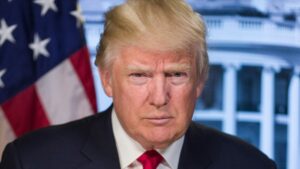Millions of Americans could soon see changes in their retirement savings and banking rights following President Donald Trump’s latest executive actions under his new “Make America Wealthy Again” initiative.
Trump Pushes for 401(k) Access to Bitcoin and Alternative Assets
The 79-year-old former president has issued a sweeping directive aimed at expanding retirement investment options. Under the order, federal agencies like the Department of Labor are instructed to revise existing retirement rules to allow 401(k) and similar plans to invest in alternative assets, including cryptocurrencies such as Bitcoin.
The directive “could eventually reshape how Americans invest for retirement,” though officials clarify that immediate changes are unlikely.
At present, most retirement plans revolve around traditional assets such as stocks, bonds, cash, and commodities. These are regulated under the Employee Retirement Income Security Act of 1974 (ERISA), which mandates fiduciary responsibility for employers offering investment options.
Debanking Under Scrutiny in Trump’s Latest Order
Trump’s executive order also targets the controversial practice of “debanking”, prompting widespread political and financial debate.
What Is Debanking?
Debanking involves financial institutions denying or closing customer accounts, citing factors like reputational or regulatory risk. Though it impacts a range of individuals—including those with poor credit or without documentation—crypto advocates and conservatives argue they are unfairly targeted due to their political beliefs.
Trump claims personal experience, stating that JPMorgan Chase and Bank of America refused his business following his presidency.
The banks, however, attribute account decisions to compliance with financial regulations like the Bank Secrecy Act, not political motives.
Are Criminal Charges or Penalties Involved?
There is no indication of new criminal charges connected to these executive actions.
The debanking order instructs regulators to review past account closures for potential violations of laws such as the Equal Credit Opportunity Act. This could result in fines or Justice Department referrals, but would affect banks, not individuals.
In parallel, the 401(k) directive is focused solely on regulatory changes, though financial experts caution that allowing riskier assets like Bitcoin may increase litigation risks for plan administrators.
Will My 401(k) Be Affected?
Trump’s order allows but does not require employers to include alternative investments in retirement plans. While this may offer higher returns, it also introduces greater risk and compliance challenges.
“Participation will vary by employer,” experts say, warning that fiduciary responsibility and volatility are key concerns.
A Boost for Crypto Investors?
Yes. The order is in line with Trump’s pro-crypto stance, opening the door for Bitcoin and other digital assets to become part of mainstream retirement plans. Still, volatility remains a critical issue for long-term investors.
Why Is Debanking a Focus Now?
Trump positions the move as protection for conservatives and crypto firms, citing personal experiences with banks. However, no confirmed data proves political bias in bank closures, indicating the issue may serve more as a political narrative.
When Will These Orders Take Effect?
Changes won’t happen overnight. Implementation depends on regulatory guidance and review periods, which could take several months. Agencies are currently in the process of developing strategies and timelines for enacting the new rules.



